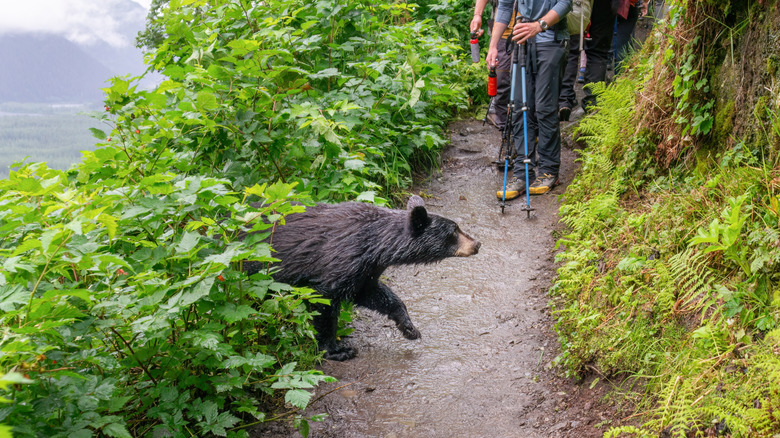This Unexpected Camping Essential Could Be A Lifesaver Against Dangerous Wildlife Encounters
We may receive a commission on purchases made from links.
Whenever you embark on an outdoor adventure, it's a good idea to take some basic safety precautions. Although large expanses of wilderness are becoming increasingly rare, there are still places around the world where nature is wild and untamed. In these rugged landscapes, predators like bears and big cats roam freely through the thick forests and craggy mountains. They are beautiful to behold, and many hikers long to spot them in their natural habitat, but they can be dangerous to humans.
It's important to keep in mind that human beings are actually one of the deadliest animals on planet earth and that most other large land mammals are just trying to survive, find food, and raise their young in peace. When we enter the wilderness, we are encroaching on their territory — not the other way around. Most wild animals would rather steer clear of hikers, campers, and backcountry explorers, but that doesn't mean they won't attack if they feel threatened. To avoid a potentially deadly encounter with a large predator, arrive prepared whenever you embark on an expedition.
Preparation means understanding common animal behaviors and researching what you need to do if you run into a bear (or any predator) while hiking. Packing some essentials to help keep you safe is also a must. You're probably used to seeing air horns at sporting events, but they can also be a simple and effective animal deterrent if you find yourself in a scary situation on the trail or at your campsite.
An air horn could save the day
Most experienced outdoor adventurers will recommend carrying bear spray any time you enter bear country. It's effective, but it is only intended to be used when an animal is within 60 feet and is charging towards you. It isn't intended to scare animals away, and you don't want to jump the gun because once your canister is empty, you'll have very little protection against an angry predator. Furthermore, there are some national parks in America where bear spray is completely banned. Using an air horn is a great way to help ensure that you don't end up in a situation where bear spray is needed.
Redditor u/ConstantAmazement wrote, "I have carried bear spray and a small boat horn for decades. I have encountered black bears, grizzlies, and wildcats from Oregon to Montana, on the CDT and the PCT. Despite some close calls, I have never used the bear spray, but the boat horn was always highly effective. You have never seen a wildcat jump so high or a bear run so fast. Highly recommended."
Some argue that bear spray and firearms are still the best defense against aggressive bears, but others claim that you will usually be able to deter any close encounters with noise makers like air horns. The loud noise scares them off when the animal is still at a distance. You should still learn the difference between brown bears and black bears and when to make noise for each species — knowing the difference could save your life. It's also important to make sure that a bear has a path to get away without running into any people. If the bear is in close range, the noise could scare them enough to prompt aggression.
Air horns for wilderness adventures
Air horns can certainly prevent potentially dangerous animals from coming a little too close for comfort while you're out in nature, but they can also come in handy for other safety related situations you may encounter on the trail. Some air horns can reach up to 150 decibels which would be a similar volume to standing next to a jet engine. They're extremely loud, and being able to make a loud noise could be life saving if you have an emergency in the wilderness. If you're lost, other hikers may be able to locate you from the noise. If you're injured, it could help emergency responders get to you faster. A 120 decibel air horn can be heard from a mile away, and sometimes even further depending on your surroundings.
Some air horns have been designed specifically as bear deterrents. REI, a popular place to shop for outdoor equipment, sells the Bear Horn by Frontiersmen for around $16. It reaches 130 decibels and can be used up to 60 times at .25 second intervals. It also has a lock so you don't accidentally set it off while hiking. Since it weighs just three ounces it's easy to take backpacking.
Keep in mind that you can't take an air horn with you on an airplane. It's not allowed to go in your carry-on or your checked bag, per TSA regulations. If you're flying to your destination, you'll have to wait to purchase your air horn until after you arrive. Alternatively, you could order online and have it shipped to your accommodation. Amazon has a few options for under $20, including the Dunkive bear horn, which has dozens of 5-star reviews.


